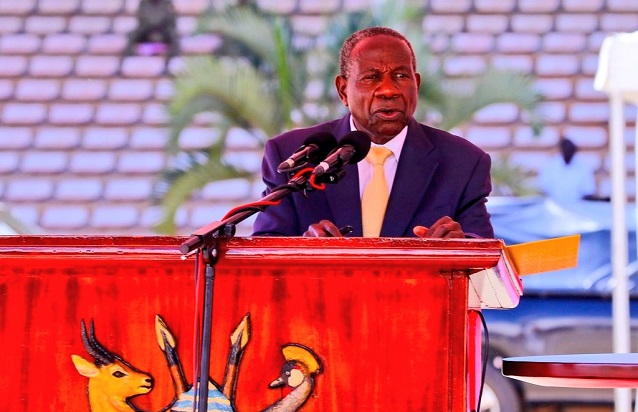Secretary to the Treasury, Ramathan Ggoobi, clashed with Members of Parliament (MPs) on the Public Accounts Committee (PAC), accusing them of using harsh language to undermine his efforts in improving the government’s budgeting process.
The heated exchange occurred on March 4, 2025, during a meeting between the committee and the Ministry of Finance to review the 2023/24 Auditor General’s report. Butambala County MP Muwanga Kivumbi criticized Ggoobi, arguing that despite his earlier commitment to addressing budget indiscipline within the government, the situation had worsened under his tenure.
“I attended the first briefing before the Budget Committee when you were appointed Secretary to the Treasury. I was inspired by your submission and thought we had entered a new era. But now, four years later, things have only deteriorated. In the eyes of Ugandans, this is gross budget indiscipline. It may not be parliamentary language, but that is the reality,” Kivumbi stated.
The debate was triggered by the Auditor General’s findings, which revealed that although Parliament initially approved a UGX 52 trillion budget for the 2023/24 financial year, the government later requested an additional UGX 8 trillion in supplementary funding. Despite these allocations, the Ministry of Finance only warranted UGX 50 trillion, a trend MPs argued had become normalized.
Kivumbi expressed frustration over the government’s budget management, saying, “We approved a UGX 52 trillion budget, but you only warranted UGX 50 trillion. Yet, you still bombarded Parliament with a UGX 8 trillion supplementary request. Clearly, there is no budget discipline—you don’t adhere to what was planned.”
Before Kivumbi could conclude, an agitated Ggoobi interjected, protesting the choice of words.
“You are using very strong language, and I must object. It is unacceptable to make such statements. We work tirelessly every day to improve the budget, and it is indeed getting better. These remarks are unfair,” Ggoobi asserted.
Kalungu West MP Joseph Ssewungu criticized Ggoobi for interrupting Kivumbi, accusing him of undermining the committee’s authority.
“I see a situation where one of the witnesses is attempting to override the Chairperson’s authority by issuing directives. Is it in order for a witness—who coincidentally comes from the same constituency as you—to attempt to usurp your powers?” Ssewungu questioned.
Bugiri Municipality MP Asuman Basalirwa reinforced the committee’s authority, emphasizing, “In these meetings, only the Chairperson has the mandate to determine whether language is strong, unparliamentary, or harsh. The rest of us can only observe and hope for leniency.”
Unfazed by Ggoobi’s objections, Kivumbi stood by his remarks.
“I understand that he is an esteemed professor of Economics, a subject I also studied. In Economics, there is a well-defined term called ‘budget indiscipline.’ If I were to ask him to define it as a former teacher, I am certain his response would apply perfectly to this situation,” Kivumbi responded.
Tororo Woman MP Sarah Opendi came to Ggoobi’s defense, arguing that Parliament also bears responsibility for the budgeting challenges due to its failure to amend the Public Finance Management Act.
“I imagine myself in the position of the Secretary to the Treasury—that office is extremely demanding. Certain decisions are not made because he wants to, but because the law permits them. We in Parliament have also failed to support him. The Public Finance Management Act should have been amended to eliminate the 3% budgetary discretion, which is often misused. What happened to that amendment?” Opendi asked.
In response to MPs’ concerns, Ggoobi acknowledged the need for reforms but defended the necessity of supplementary budgets, citing unforeseen financial demands.
“It is unrealistic to assume that we should never request supplementary funds before exhausting the approved budget. These are separate expenditures that arise unexpectedly. It does not mean we are violating budgetary discipline; rather, we are responding to urgent needs,” he explained.
He admitted that some supplementary requests result from poor planning and budgeting but assured MPs that efforts were underway to address these issues.
“We recognize the concerns surrounding supplementary budgets. Some requests stem from inadequate planning, and we are working to correct this. We have committed to both the Auditor General and Parliament to improve this process, and we invite you to assess our progress moving forward,” Ggoobi stated.
While acknowledging that budget unpredictability is inevitable, he maintained that the Ministry of Finance is striving to ensure more efficient budget management.
“There will always be unforeseen financial demands that require funding. This is not necessarily budget indiscipline—it is sometimes the reality of governance. However, we are also addressing poor planning to minimize unnecessary supplementary requests,” he concluded.





